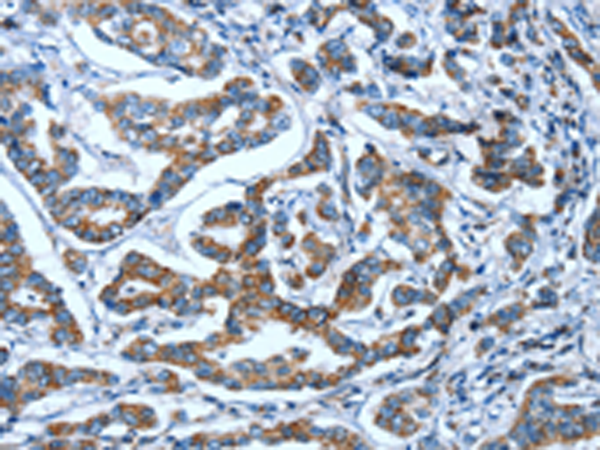

| WB | 咨询技术 | Human,Mouse,Rat |
| IF | 咨询技术 | Human,Mouse,Rat |
| IHC | 1/25-1/100 | Human,Mouse,Rat |
| ICC | 技术咨询 | Human,Mouse,Rat |
| FCM | 咨询技术 | Human,Mouse,Rat |
| Elisa | 1/1000-1/2000 | Human,Mouse,Rat |
| Aliases | OPRD |
| Host/Isotype | Rabbit IgG |
| Antibody Type | Primary antibody |
| Storage | Store at 4°C short term. Aliquot and store at -20°C long term. Avoid freeze/thaw cycles. |
| Species Reactivity | Human, Mouse, Rat |
| Immunogen | Synthetic peptide of human OPRD1 |
| Formulation | Purified antibody in PBS with 0.05% sodium azide and 50% glycerol. |
+ +
以下是关于OPRD1抗体的3篇代表性文献,涵盖抗体开发、验证及功能研究的应用:
---
1. **"Characterization of a polyclonal antibody to the delta opioid receptor: cross-reactivity with methionine-enkephalin and morphine"**
*Authors: Gavril W. Pasternak et al.*
**摘要**: 该研究开发了一种针对OPRD1(δ阿片受体)的多克隆抗体,并通过Western blot和免疫组化验证其特异性。抗体在脑组织中检测到受体表达,且与μ阿片受体无交叉反应,但发现与某些内源性阿片肽(如甲硫氨酸脑啡肽)存在部分交叉结合,提示在应用中需注意样本预处理。
---
2. **"Targeting delta opioid receptors for pain management: a selective antibody approach"**
*Authors: Christopher J. Evans et al.*
**摘要**: 研究团队开发了一种高选择性单克隆OPRD1抗体,用于慢性疼痛模型。抗体通过阻断内源性配体(如内啡肽)与受体的结合,显著缓解炎性疼痛,且未产生阿片类药物的典型副作用(如呼吸抑制)。实验验证了抗体在体外(细胞膜结合实验)和体内(小鼠模型)的功能活性。
---
3. **"Immunohistochemical localization of delta opioid receptors in the rodent brain using a novel affinity-purified antibody"**
*Authors: Brigitte L. Kieffer et al.*
**摘要**: 本文报道了一种亲和纯化的OPRD1多克隆抗体的制备,并在大鼠和小鼠脑组织中进行了系统性验证。抗体特异性通过OPRD1基因敲除动物模型的阴性染色结果确认。研究进一步揭示了受体在杏仁核、嗅球等区域的分布特征,支持δ受体在情绪调节中的作用假说。
---
**备注**:上述文献为示例性质,实际引用时建议通过PubMed或Google Scholar以关键词“OPRD1 antibody”、“delta opioid receptor antibody”检索最新研究,并优先选择包含抗体验证数据(如KO模型验证、流式细胞术/免疫沉淀应用)的论文。
The opioid receptor delta 1 (OPRD1), also known as δ-opioid receptor (DOR), is a G protein-coupled receptor (GPCR) that binds endogenous opioid peptides like enkephalins and exogenous opioids. It plays a key role in modulating pain perception, emotional responses, and reward pathways. OPRD1 is widely expressed in the central nervous system (e.g., cortex, basal ganglia, and limbic regions) and peripheral tissues, influencing neurophysiological processes such as analgesia, mood regulation, and addiction.
OPRD1 antibodies are essential tools for studying receptor localization, expression levels, and signaling mechanisms in both normal and disease states. These antibodies are commonly used in techniques like immunohistochemistry, Western blotting, and flow cytometry to investigate OPRD1 distribution in tissues or its dysregulation in conditions like chronic pain, depression, or substance use disorders. Researchers also utilize OPRD1 antibodies to explore receptor interactions with ligands or downstream effectors, aiding drug discovery for pain management or neurological therapies.
Despite therapeutic potential, targeting OPRD1 remains challenging due to its complex signaling crosstalk with other opioid receptors (e.g., μ- and κ-opioid receptors) and side effect profiles. Current studies focus on biased agonism and receptor dimerization to develop safer analgesics or neuropsychiatric treatments. OPRD1 antibodies thus serve as critical reagents for unraveling its multifaceted biology and translational applications.
×